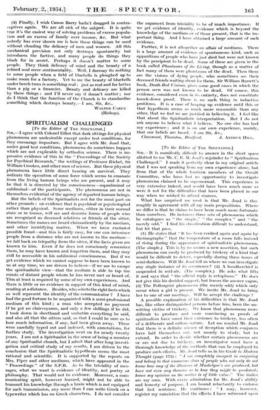SPIRITUALISM CHALLENGED
[To the Editor of THE SPECTATOR.]
Sta,—I agree with Colonel Elliot that dark Wttings for physical phenomena are undesirable except under test conditions, for they encourage imposture. But I agree with Mr. Joad that, under good test conditions, phenomena do sometimes happen which are not explicable by orthodox science. There is im- pressive evidence of this in the "Proceedings of the Society for Psychical Research," the writings of Professor Richet, Sir William Crookes, and other men of science. But these physical phenomena have little direct bearing on survival. They indicate the operation of some force which seems to emanate from the living human beings who are present, and it may be that it is directed by the consciousness—supraliminal or subliminal—of the participants. The phenomena are not in themselves evidential of the agency of departed human beings.
But the beliefs of the Spiritualists rest for the most part on other grounds : on evidence that is psychical or psychological rather than physical. Some mediums, either in their normal state or in trance, will see and describe forms of people who are recognized as deceased relatives or friends of the sitter. Sometimes the names are heard clairaudiently by the medium, and other identifying matter. When we have excluded possible fraud—and this is fairly easy, for one can introduce people from a distance who are not known to the meditun- we fall back on telepathy from the sitter, if the facts-given are known to him. Even if he does not consciously remember them, he may have known and forgotten them, and they may still be accessible in his subliminal consciousness. But if we get evidence which we cannot suppose to have been known to us at any time, we are driven to believe—if we are to escape the spiritualistic view—that, the medium is able to tap the minds of distant people whom he has never met or heard of. This at least is required by some of my own experiences. And there is little or no evidence in support of this kind of mind_ reading at a distance. Besides, who selects the right facts which so well represent the identity of the communicator ? I have had the good fortune to be acquainted with a semi-professional medium of this kind ; a man who accepted no payment if he got no clairvoyance, and only a few shillings if he did. I took down in shorthand and verbatim everything he said, and also all that the sitters said, so that I could be sure as to how much information, if any, had been given away. These were carefully typed out and indexed, with annotations, for further study. The investigation went on for nearly twenty years.. I am not a Spiritualist in the sense of being a member of any Spiritualist church, but I admit that after long investi- gation and critical study of my results, I am driven to the conclusion that the Spiritualistic hypothesis seems the most rational and scientific. It is supported by the reports on Mrs. Piper and' other mediums, which have appeared in the " Proceedings " of the S.P.R. As to the triviality of mes- sages, what we want is evidence of identity, not poetry or philosophy. That would not be evidence. Moreover, a com- municating spirit, however learned, might not be able to transmit his knowledge through a brain which is not equipped for such transmission, any more than I can write Greek on a typewriter which has no Greek characters. I do not consider the argument from triviality to be of much importance. If we get evidence of identity, evidence which is beyond the knowledge of the medium or of those present, that is the int- -portant thing. And I have obtained a large amount of such *evidence.
Further, it is not altogether an affair of mediums. There is a large amount of evidence of spontaneous kind, such as apparitions of people who have just died but were not known by the percipient to be dead. Some of these arc given in the book called -Phantasms of the Living, though as a matter of fact many of them were phantasms of the dead. Then there are the visions of dying people, who sometimes see their deceased friends waiting about for them. Sir William Barrett's book, Death-Bed Visions, gives some good cases in which the person, seen was not known to be dead. Of course, this evidence, considered even in its entirety, does not constitute knock-down proof. There is no such thing in inductive problems. It is a case of heaping up evidence until this or that hypothesis seems so much more reasonable than any other, that we feel we are justified in believing it. I feel like that about the Spiritualistic interpretation. But I do not ark anyone to believe what I believe. No one else has had my experience ; and it is on our own experience, mainly, that our beliefs are based.-1 am Sir, &e., Claremont, Thornton, Bradford. J. ARTHUR HILL.








































 Previous page
Previous page